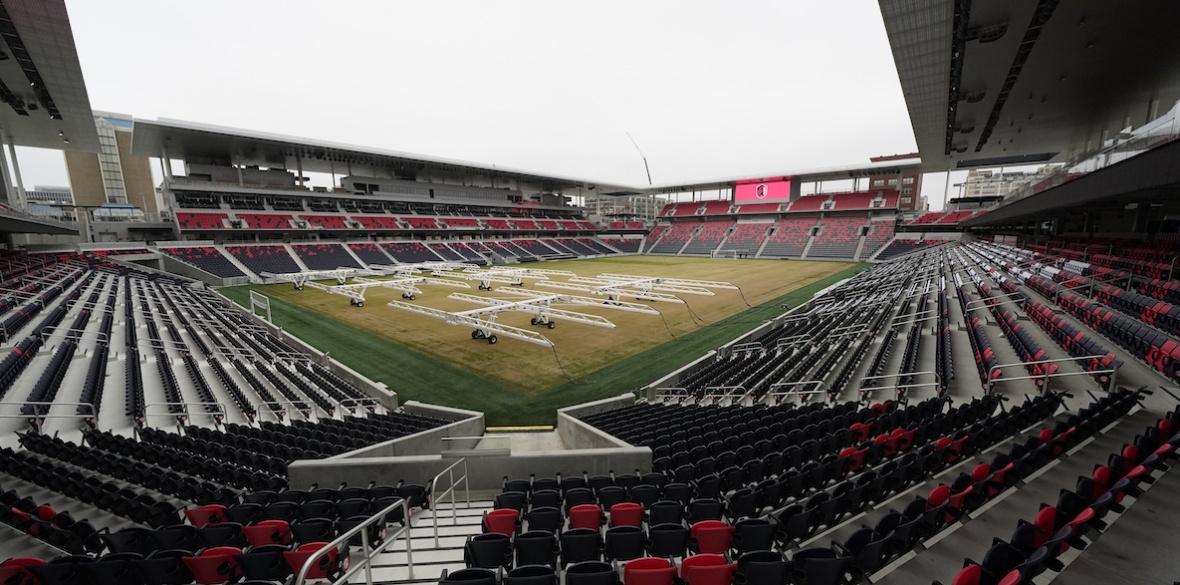This is the last article you can read this month
You can read more article this month
You can read more articles this month
Sorry your limit is up for this month
Reset on:
Please help support the Morning Star by subscribing here
THE city of St Louis, Missouri, gained a Major League Soccer team this season, taking North America’s flagship soccer league up to 29 teams.
They will play their first home game this weekend when they welcome Charlotte FC to the Citypark Stadium.
Their addition to MLS is significant as it sees one of the country’s historic soccer cities join the ever-growing league.
Despite not having an MLS team until this season, the city of St Louis would regularly be mentioned in soccer circles, perhaps even more than some existing MLS cities, thanks to its place in the sport’s history in the United States.
The most famous St Louis soccer story is the city’s link to the team that defeated England 1-0 in Belo Horizonte at the 1950 World Cup in Brazil. That side contained five St Louisans, and on the back of such a monumental result in the history of US soccer, a book was written detailing these players’ stories — The Game of Their Lives, by Geoffrey Douglas, later turned into a film.
A more recent book, Soccer Made in St Louis, by Dave Lange, looks in more depth at the city’s soccer history as a whole.
The region boasted an early professional league in the United States which ran until 1939, while six teams from the region have won America’s FA Cup equivalent, the US Open Cup — Stix Baer and Fuller, St Louis Kutis, St Louis Simpkins-Ford, Ben Millers, St Louis Busch Seniors and St Louis Scullin Steel. Only New York can boast more winners in that competition.
Despite its soccer past, until this year St Louis remained conspicuously absent from the present MLS setup, but that doesn’t mean there wasn’t soccer being played.
There have been numerous teams over the years including more recently AC St Louis, Saint Louis Athletica, and Saint Louis FC (all now disbanded) and several indoor sides, but the nature of US soccer means it is difficult to maintain a team in the lower divisions when there is no prospect of promotion.
A supporters group known as the Saint Louligans have been present since around 2010, emerging from various fan groups who watched the AC St Louis club before taking their support to whichever team happened to be playing pro soccer in the city — and at times taking it to amateur or indoor teams, too.
Saint Louis FC played their final season in 2020, citing the financial impact of Covid-19 as the main reason for ceasing operations. By that time the MLS team was already approved by the league and scheduled to begin play in 2023. This could also have played a part in Saint Louis FC folding.
“Due to the 2020 Covid pandemic’s economic factors and the looming arrival of MLS to our city, Saint Louis FC folded in 2020,” reads the most recent entry in Louligans history on their website.
“While we’re sad that chapter is over, we’re excited for what’s next.
“Every time we’ve had to start over we come back bigger and better.
“No matter what, we’ll be there in 2023 in the supporter section for St Louis City SC. We invite you all to join us.”
A supporters’ group turning their attention to a new league isn’t always an easy thing to do, especially when, as they state, the new league may have played a part in the demise of a previous team. But the Louligans’ history of flexible support, not just for single teams, but soccer in the city of St Louis as a whole, has helped them adapt.
It is to MLS where the Louligans now turn their attention, taking the soul and character of previous St Louis clubs with them, but for some supporters of other teams in the “lower leagues”, whose culture is more attached to one club and the identity of that club, it could be more difficult to adapt.
The expansion of MLS continues apace, and in the past five years, they have added teams from Cincinnati, Miami, Nashville, Austin, Charlotte, and now St Louis.
There will be more to come, but as MLS arrives in more cities across the country, they might increasingly find themselves encroaching on existing clubs whose soccer culture might not transplant so readily to MLS.
The franchise system, with no promotion or relegation from or to the “lower leagues” in the United States, means expansion is the only way a new side can enter MLS, and there is now a substantial price to pay for access. Charlotte paid a $325 million expansion fee while St Louis forked out $200 million.
The league considered the tier below MLS in the unclimbable American soccer pyramid is the USL Championship. It is part of the collection of leagues under the United Soccer Leagues banner and the league in which Saint Louis FC once played.
The team that wins that championship is not promoted to MLS and no MLS teams are relegated to it.
MLS commissioner Don Garber recently revealed that the next expansion team would be announced by the end of this year.
“I never thought we’d be at 28, never thought we’d be at 29, we said we are gonna stop at 30 but the other major leagues are larger than that so we never say never,” Garber said.
“There are many other markets with opportunities for us, I think San Diego and Las Vegas are the most likely opportunities for 30 but we don’t have a team in Phoenix, we don’t have a team in Sacramento, we don’t have a team in Detroit, all big markets in our country so you never know.
“Tampa is another big city. Soccer is exploding professionally everywhere, on the men’s and women’s side, so we’ll see.”
Garber hinted at soccer’s expansion “below” MLS and name checked several cities, a few of which already have relatively successful teams.
USL Championship side Sacramento Republic were one of the stories of 2022 in American soccer as they made it all the way to the US Open Cup final, knocking out three MLS sides to get there before losing to Orlando City.
Tampa Bay Rowdies topped the USL Championship regular season standings in 2021 and are among the favourites in 2023.
Detroit City has gained a reputation as one of the most fervently supported clubs in USL. That following and club character will be one of the reasons Garber mentioned them in his list but were Detroit to become part of the expansion of MLS, whether continuing with the Detroit City name or creating an entirely new team, they would lose much of what makes Detroit City, Detroit City.
As a result, some fans are averse to the arrival of MLS in the city (they actually play their games in the city of Hamtramck within Detroit, which itself adds to their character) and there is an increasing sense that football clubs can thrive more independently, without needing to be swallowed up by MLS.
MLS uses artificial expansion to grow its league, but more natural expansion is happening across the country outwith MLS.
For St Louis, though, there is keen anticipation around their home opener and their addition to the league.
The Louiligans supporters group will likely grow, and through them, the books and articles already written, and film already recorded, the spirit of St Louis’s soccer past lives on in the present.











